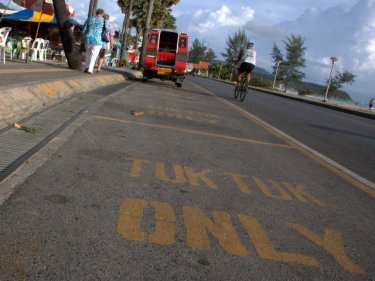The Interior Ministry team's findings are likely to be known before Thailand's Cabinet meets on Phuket - probably on March 19-20 and with PM Yingluck Shinawatra attending - to discuss practical solutions to what passes for public transport on Phuket.
Announcing the taxi/tuk-tuk investigation and the Cabinet meeting, Phuket Governor Tri Augkaradacha said yesterday that he expected the Bangkok investigative team would work with his Phuket committee as it continues to look for solutions to Phuket's multiple transport woes.
Governor Tri said that he had yet to receive letters formally announcing the Phuket visits by the Interior Ministry investigative team and Cabinet, but expected the letters to arrive soon.
More that 4000 privately owned vehicles are being used as taxis on Phuket because the extortionate fares agreed among local taxi and tuk-tuk groups make being a ''black'' cab driver an easy way to earn a living for any local who drives a car.
In most other places, a relatively small but efficient number of taxis answer calls 24 hours a day to provide a reasonably priced service for passengers who need to go from Point A to Point B swiftly.
On Phuket, historic village monopolies have retained their place well into the 21st century. Fares are set at extremely high rates and local groups, sometimes described as ''mafia'' because of their intimidatory tactics, ensure that they retain their monopolies.
On Phuket, taxis from Point A may carry passengers to Point B but only taxis from Point B can carry passengers from Point B to Point A.
Apart from a small group of regular taxis based at Phuket International Airport, there is no cab-call system on Phuket - making Phuket probably the only international holiday island of any stature without that kind of service.
New resorts about to open on Phuket usually have to go through the process of negotiating with local drivers to decide who is entitled to pick up and drop off passengers at the resort.
Any driver who tries to enter a resort without authorisation to pick up passengers is likely to be met with threats or even violence, as tourists continue to discover.
The aggressive attitude of some drivers and extortionate fares, along with the basic conditions of most taxis and tuk-tuks, is often criticised by holidaymakers as a negative for Phuket and cited as a reason why many do not return.
Even more significantly, local Phuket residents are forced from an early age to ride their own motorcycles - at considerable danger and in overcrowded traffic - because the taxi and tuk-tuk monopolies have prevent an economical public transport network of buses being established.
Members of the families of taxi and tuk-tuk drivers have been among those killed or maimed on Phuket's roads because there is no safe, reasonably priced alternative.





I sincerely hope that this will be the beginning of the end of the overpriced, violence marred transportation problems in Phuket.
Bringing the prices in line with those of Bangkok would be welcome. Even if there was a 10% island surcharge, compared to Bangkok, I think that people could live with it.
Posted by Relic on January 19, 2012 13:05